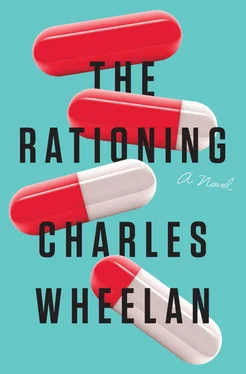“If you fix the language, it would work real well. People get that.”
“Did you watch the Chinese Ambassador’s remarks?” the President asked.
“Yes. He made the whole situation seem like some kind of showdown—that whole flying east or west thing.”
“That language came from Beijing.”
“I assumed as much.”
The President said, “I spoke to the Australian Prime Minister. She’s worried we’ll ditch our commitments to the region.”
“Of course she is.”
There was a long silence. As the Majority Leader would later describe it, he waited patiently for the President to steer the conversation. Eventually the President said, “Let me bounce an idea off you.”
JENNA PERSUADED ME TO TAKE A WALK, TO GET OUT OF THE NIH building and clear my head. I had been awake since before dawn; I had not had enough sleep in the week before that. “Let’s see a movie,” she offered.
“I can’t do that,” I said quickly. “It feels totally wrong.”
“You’re not going to figure this out by grinding away,” she implored. “That’s not how inspiration works. What you should do is go home and sleep for twelve hours.”
It was late afternoon and the spring day was turning cool. We did not plan where we would walk, but we headed toward the Capitol Mall, which felt like a logical place to go. The cherry blossoms were past their peak—they came early that year—but the view was still beautiful. Even in my most cynical moments, I appreciated the majesty of the Capitol, the White House, and the monuments in between. I had never taken the time to explore the city properly as a tourist, but I did pause on occasion to reflect on whatever monument or historical site I happened to wander past. Even on my busiest, most self-absorbed days, I could not rush by the Vietnam Memorial without giving some thought to the names on the wall, and, by extension, to the decisions that got them there. I was always affected by the mementos left at the base of the wall: a single boot, or a can of Pabst beer, or a Chicago Cubs hat—mundane objects that clearly had enormous significance for those who had taken the time to leave them behind.
One day some months earlier I had accidentally shown up for a meeting at a Starbucks near the Mall an hour early. There was no sense in heading back to my office, so I took advantage of the found time to walk through the Roosevelt Memorial, wondering how the man was able to confront the unique challenges of the Great Depression and World War II. How might the U.S. have fared with lesser leadership? With someone who lacked FDR’s remarkable ability to reach and persuade the American people? Sometimes I wondered if the tourists—guidebooks in hand, checking off site after site—were really processing what they were seeing. Never mind the dates or the height of the sculpture or the other details that can get in the way of really thinking about FDR. The whole system had been under assault. Some really smart people had given up on capitalism, attracted by the false allure of communism. Another group of smart people were ready to ditch the untidiness of democracy for the efficiency they were seeing in Italy and Germany. How did FDR get out of bed in the morning? And by that, I do not mean anything to do with his paralysis, because to focus too much on the fact that he was in a wheelchair is to miss the essence of what really made him so extraordinary.
Jenna and I sat on a bench in the shade with a nice view of the Washington Monument. I was struck by the sense of normalcy that was returning to the city, barely twelve hours after the first news of the Outbreak had gone public. It was as if the public, unable to see any obvious manifestation of a crisis, began to assume that things must not be so bad. Shortly after we sat down, a Chinese tour group walked loudly by, following a guide carrying a large orange umbrella. Even in the moment, I appreciated the irony. I looked at my phone, where the first details of the Chinese offer were being reported. Jenna said, “Twenty minutes.”
“Twenty minutes what?” I asked.
“You’ve got twenty minutes to think and talk about Capellaviridae . After that, give your mind a break.”
“The White House just released the details of the Chinese Dormigen offer,” I said.
“And?”
“It’s even more unreasonable than we expected,” I said, reading the first stories as they appeared. News organizations were rushing to get out their own versions of the story, but the “Friendship Agreement” was long enough that it required time to read and digest thoroughly. As a result, minutes after the Communications Director walked copies of the document to the back of Air Force One, media outlets began releasing details in bursts. The Associated Press was first, just three minutes after getting the report, posting: “Chinese Government Issues Demands for Dormigen.” Bloomberg followed shortly thereafter with more specifics: “Beijing: Ditch South China Sea Agreement, Withdraw from ‘Chinese Sphere of Influence.’” The New York Times and other publications posted the whole agreement to their sites. The public immediately fixated on the incongruity of Beijing demanding a complete withdrawal of U.S. troops from the region and more parking permits at the UN. The pettiness of the latter somehow threw the sacrifice of the former into sharper relief.
Jenna was reading from my screen. “I assume the President’s not going to accept that,” she said.
“He’s going to make a statement in forty-five minutes.”
“Okay, then you get an hour to think about Capellaviridae .”
“How about if I think about it for the rest of the day, if I promise to get ten hours of sleep?” I pleaded.
“That’s probably better.”
“So here’s what I’m thinking,” I began. “The places where people are getting sick from Capellaviridae are the places where there have been intensive efforts to get rid of the North American dust mite.”
“Right.”
“And Capellaviridae is also prone to turn virulent when people move away from a region where dust mites are endemic to one where they are not.”
“Yes.”
“That’s odd, right?” I asked. Jenna nodded and I continued. “If you strip away everything else we think we know, that’s the bit that feels strangest. The dust mite is the vector, but for some reason once you are carrying Capellaviridae , you are better off if there are still dust mites around.”
“It could be just some kind of statistical aberration,” Jenna offered.
“Maybe,” I said skeptically, my voice trailing off as ideas bounced around. “Okay, there are three crazy things about lurking viruses that we can’t explain.”
“And they are?”
“First, the virus infects humans for no particular reason. Humans don’t spread it, so there is no obvious advantage to the virus from infecting humans.”
“Okay.”
“Second, the virus is benign most of the time, then suddenly virulent, for no obvious reason.”
“Right. And third?”
“The virus is somehow more likely to be benign when the vector—the dust mite—is still present.”
“None of it makes any sense,” Jenna said.
“Maybe they make sense together,” I suggested. “That’s the Huke final exam question: How do these things make sense together?”
Jenna laughed. “Except we never got the required reading.”
“Then we’ll just have to figure it out,” I said.
We began tossing around ideas and theories. Eventually the time drew near for the President’s statement.
“Shall I stream it?” I asked.
THE COMMUNICATIONS DIRECTOR HAD ISSUED SPECIFIC instructions to the traveling press corps: a handful of print reporters were to stay on board Air Force One; the cameras were to be on the tarmac, presumably because the President would be making his statement from the stairs of the plane, or on the tarmac. The print reporters balked at being told to stay on the plane. The Home Depot Media correspondent demanded to get off. “You can do whatever you want,” the Communications Director told him. “But if you get off the plane, you’re not getting back on. Anything the President says will be piped back here in the cabin, so you’ll hear it in real time. Trust me on this one.” By and large the press corps did trust him, something he had earned over time. The Communications Director could parry and obfuscate with the best of them, but he was never overtly dishonest. He had been a political reporter and an international correspondent for nearly twenty years, mostly television, before the President had tapped him to cross to the “dark side.” Reporters were always skeptical of paid flacks, but at least the Communications Director was a former member of their guild.
Читать дальше












